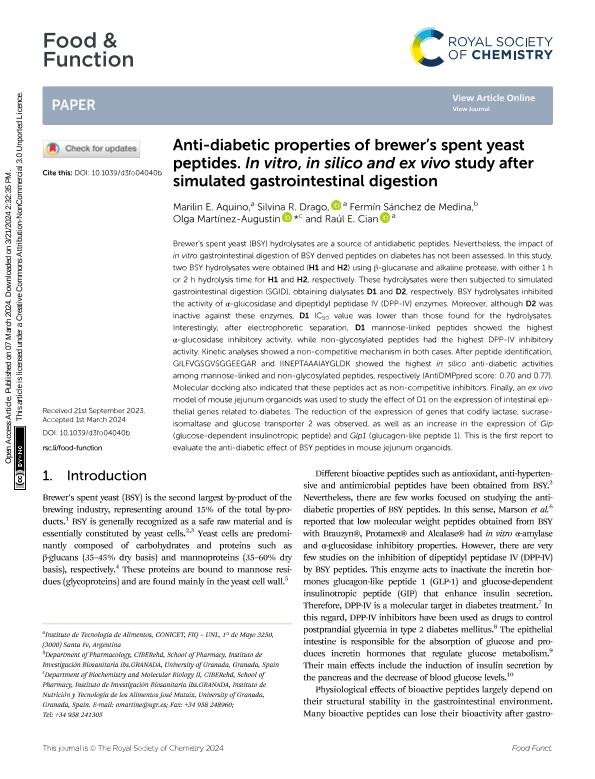Artículo
Anti-diabetic properties of brewer's spent yeast peptides: In vitro, in silico and ex vivo study after simulated gastrointestinal digestion
Aquino, Marilín Estefanía ; Drago, Silvina Rosa
; Drago, Silvina Rosa ; Sánchez de Medina, Fermín; Martínez Augustin, Olga; Cian, Raúl Esteban
; Sánchez de Medina, Fermín; Martínez Augustin, Olga; Cian, Raúl Esteban
 ; Drago, Silvina Rosa
; Drago, Silvina Rosa ; Sánchez de Medina, Fermín; Martínez Augustin, Olga; Cian, Raúl Esteban
; Sánchez de Medina, Fermín; Martínez Augustin, Olga; Cian, Raúl Esteban
Fecha de publicación:
03/2024
Editorial:
Royal Society of Chemistry
Revista:
Food & Function
ISSN:
2042-6496
e-ISSN:
2042-650X
Idioma:
Inglés
Tipo de recurso:
Artículo publicado
Clasificación temática:
Resumen
Brewer´s spent yeast (BSY) hydrolysates are a source of antidiabetic peptides. Nevertheless, the impact of in vitro gastrointestinal digestion of BSY derived peptides on diabetes has not been assessed. In this study, two BSY hydrolysates were obtained (H1 and H2) using β-glucanase and alkaline protease, with either 1 h or 2 h hydrolysis time for H1 and H2, respectively. These hydrolysates were then subjected to simulated gastrointestinal digestion (SGID), obtaining dialysates D1 and D2, respectively. BSY hydrolysates inhibited the activity of α-glucosidase and dipeptidyl peptidase IV (DPP-IV) enzymes. Moreover, although D2 was inactive against these enzymes, D1 IC50 value was lower than those found for the hydrolysates. Interestingly, after electrophoretic separation, D1 mannose-linked peptides showed the highest α-glucosidase inhibitory activity, while non-glycosylated peptides had the highest DPP-IV inhibitory activity. Kinetic analyses showed a non-competitive mechanism in both cases. After peptide identification, GILFVGSGVSGGEEGAR and IINEPTAAAIAYGLDK showed the highest in silico anti-diabetic activities among mannose-linked and non-glycosylated peptides, respectively (AntiDMPpred score: 0.70 and 0.77). Molecular docking also indicated that these peptides act as non-competitive inhibitors. Finally, an ex vivo model of mouse jejunum organoids was used to study the effect of D1 on the expression of intestinal epithelial genes related to diabetes. The reduction of the expression of genes that codify lactase, sucrase-isomaltase and glucose transporter 2 was observed, as well as an increase in the expression of Gip (glucose-dependent insulinotropic peptide) and Glp1 (glucagon-like peptide 1). This is the first report to evaluate the anti-diabetic effect of BSY peptides in mouse jejunum organoids.
Archivos asociados
Licencia
Identificadores
Colecciones
Articulos(CCT - SANTA FE)
Articulos de CTRO.CIENTIFICO TECNOL.CONICET - SANTA FE
Articulos de CTRO.CIENTIFICO TECNOL.CONICET - SANTA FE
Citación
Aquino, Marilín Estefanía; Drago, Silvina Rosa; Sánchez de Medina, Fermín; Martínez Augustin, Olga; Cian, Raúl Esteban; Anti-diabetic properties of brewer's spent yeast peptides: In vitro, in silico and ex vivo study after simulated gastrointestinal digestion; Royal Society of Chemistry; Food & Function; 15; 7; 3-2024; 3778-3790
Compartir
Altmétricas



